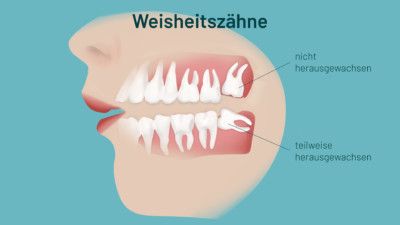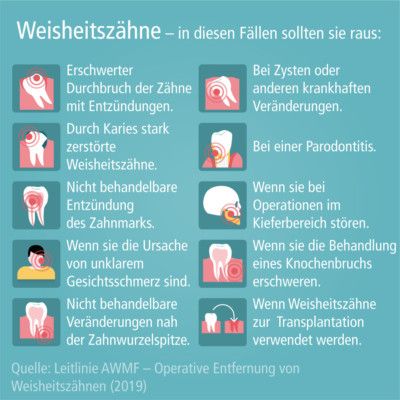
To remove wisdom teeth or not?
Whereas in the past it was advised to extract wisdom teeth even if they were not causing any problems, today dentists only remove them if health problems occur or are foreseeable.
Wisdom tooth surgery is one of the most common outpatient surgeries. “However, it has not yet been proven that the precautionary extraction of a symptom-free wisdom tooth has any health benefits,” explains PD Dr. Frank Peter Strietzel of the Charité, University Medicine Berlin.
“It is therefore always an individual decision whether wisdom teeth can remain in the mouth or whether it is better to remove them.”
In up to 80 percent of young adults in Europe, individual wisdom teeth do not grow out of the jaw at all or only partially without causing problems. Dentists speak of “retained” teeth, i.e. teeth that have been held back.
© proDente e.V./julistrations.de
Wisdom teeth – to operate or not to operate?
A recommendation for the individual case is made by dentists after a thorough clinical examination and on the basis of X-ray examinations, taking into account the patient’s medical history.
It includes, among other things, questioning about possible complaints of the wisdom tooth and their course, as well as any general medical characteristics that may be present.
In a detailed discussion, dentists advise their patients while taking into account all the findings obtained. It is always necessary to weigh the expected benefits of the procedure against the individual risks.
Various risk factors are taken into account: on the one hand, those that can make wisdom tooth removal more difficult, and on the other hand, those when the wisdom tooth is left in place.
Possible complications from the removal of the wisdom teeth as well as possible complications from leaving the wisdom teeth in place must also be weighed up.
Wisdom teeth – new guideline on surgery
Various dental societies and institutions have jointly published updated guidelines on the surgical removal of wisdom teeth in the summer of 2019.
Thus, the removal of a wisdom tooth is z.B. not necessary, if it fits into the tooth row with orthodontic treatment or it is necessary for a dental prosthesis supply.
“If, on the other hand, there is a medical reason for the removal of wisdom teeth or if this is foreseeable, the procedure should be carried out during the development of the tooth root. This means, if possible, before the age of 25. The wisdom teeth must be removed by the time the patient reaches the age of 18,” explains Strietzel.
This is because studies show that complications are more likely to occur during surgery with increasing age.
Wisdom teeth – in these cases they should be removed
In the following cases, dentists usually advise removing wisdom teeth that have not fully erupted:
- Impeded eruption of wisdom teeth with inflammation,
- wisdom teeth severely destroyed by caries,
- non-treatable inflammation of the dental pulp,
- if they are the cause of unclear facial pain,
- non-treatable changes near the tip of the tooth root,
- In the case of cysts or other pathological changes,
- for periodontitis,
- if they interfere with operations in the jaw area,
- if they complicate the treatment of a bone fracture,
- When wisdom teeth are used for transplantation.
In addition, however, there are other possible reasons for wisdom tooth removal. The advantages and disadvantages of the procedure must be carefully weighed in each individual case.

© proDente e.V./piabublies.de





